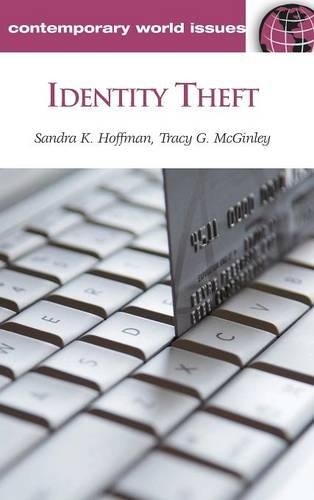
Identity Theft: A Reference Handbook
(Hardback)
Publishing Details
Identity Theft: A Reference Handbook
By (Author) Sandra K. Hoffman
By (author) Tracy G. McGinley
Bloomsbury Publishing PLC
ABC-CLIO
14th December 2009
United States
Classifications
General
Non Fiction
364.163
Physical Properties
Hardback
280
Width 152mm, Height 229mm
510g
Description
A comprehensive examination of different forms of identity theft and its economic impact, including profiles of perpetrators and victims and coverage of current trends, security implications, prevention efforts, and legislative actions. What are the common forms of identity theft Who are the most likely targets What is law enforcement doing to counter a crime perpetrated not only by petty thieves and sophisticated con artists, but by terrorists, money-launderers, and those involved in human trafficking, drug trafficking, and illegal immigration Identity Theft: A Reference Handbook examines these questions and more. With the 1998 Identity Theft and Assumption Deterrence Act as its starting point, this informative volume begins by explaining the federal, state, and global definitions of identity theft and how the lack of a standardized approach masks the true pervasiveness of the problem. In addition to addressing the crime's perpetrators, methods, and victims, the book also looks at what individuals, businesses, and the government are doingand should consider doingto curb the growth of this crime.
Reviews
. . . a welcome addition to academic and community library Criminology reference collections in general, and should be considered essential reading by anyone having to deal with identity theft or its threat in their own lives. * Midwest Book Review *
This resource is highly recommended for al libraries and anyone seeking information about this growing problem and what is being done to prevent it in the future. * ARBA *
Clearly and precisely written, this volume offers extremely helpful references at the end of chapters. A plethora of recent publications are devoted to this topic, but few are arranged as reference handbooks or are so easy to consult. This book will be useful in both academic and public libraries. Summing Up: Recommended. Lower-level undergraduates and above; general readers. * Choice *
Author Bio
Sandra Hoffman is director of the Identity Theft Program at Michigan State University, East Lansing, MI. She holds a Bachelor of Arts degree in Human Services. Tracy McGinley holds a masters degree and works as an instructor at Bowling Green State University-Firelands College in Sandusky, OH.
